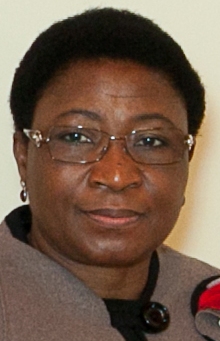Related Research Articles

Cinema of Africa covers both the history and present of the making or screening of films on the African continent, and also refers to the persons involved in this form of audiovisual culture. It dates back to the early 20th century, when film reels were the primary cinematic technology in use. During the colonial era, African life was shown only by the work of white, colonial, Western filmmakers, who depicted Africans in a negative fashion, as exotic "others". As there are more than 50 countries with audiovisual traditions, there is no one single 'African cinema'. Both historically and culturally, there are major regional differences between North African and sub-Saharan cinemas, and between the cinemas of different countries.

Sarah Maldoror was a French filmmaker of French West Indies descent. She is best known for her feature film Sambizanga (1972) on the 1961–1974 war in Angola.
Hélène Châtelain was a French actress who appeared as "the woman" in Chris Marker's La Jetée (1962), and later worked with playwright Armand Gatti and Iossif Pasternak. She was also a translator, writer and filmmaker (Goulag).

Fanta Regina Nacro is well known for being the first woman from Burkina Faso to direct a feature film and is a founding member of the Guilde Africaine des Realisateurs et Producteurs. She is an artist who explores the themes of African cinema while tackling issues surrounding illness such as AIDS, and education for the girl child. She represents the "New African Wave". Nacro's films tend to question the traditions of Burkina Faso, while looking at the relationship between tradition and modernity in today's world.
Sarah Bouyain is a French-Burkinabé writer and film director. Her first full-length film, The Place in Between, was released in 2010.

Arnold Antonin is a Haitian film director. A man of diverse careers, Arnold Antonin is known both inside and outside Haiti for his social, political and cultural commitment. He was honored for lifetime achievement with the Djibril Diop Mambety award at the International Film Cannes Festival in 2002. He received the Paul Robeson African Diaspora best film award at FESPACO in Ouagadougou in 2007, 2009, and 2011. He also received numerous awards and accolades at festivals for his documentaries and fiction movies. He was president of the Haitian Filmmakers Association (AHC) from 2005 to 2009.

The cinema of Senegal is a relatively small film industry which experienced its prime from the 1960s through to the early 1980s, but has since declined to less than five feature films produced in the last ten years. Senegal is the capital of African cinema and the most important place of African film production after its independence from France in 1960.
Swedish artist Gunvor Grundel Nelson was born in 1931 in Kristinehamn, Sweden, where she now resides. She has worked as an experimental filmmaker since the 1960s. Some of her most widely known works were created while she lived in the Bay Area in the mid-1960s and early 1970s, where she became well established among other artists in the avant-garde film circles of the 1960s and to the present. As of 2006, she has to her credit 20 films, five videos, and one video installation.
Issa Traoré de Brahima is a filmmaker from Burkina Faso.
Laurent Salgues is a French filmmaker.
Femmes aux yeux ouverts is a Togolese documentary film directed by Anne-Laure Folly. It covers the lives of contemporary African women in Burkina Faso, Mali, Senegal and Benin.
Sarah Maldoror ou la nostalgie de l'utopie is a Togolese short documentary film directed by Anne-Laure Folly. It was released in 1999.

Monique Ilboudo is an author and human rights activist from Burkina Faso. As of 2012, she was Ambassador Extraordinary and Plenipotentiary of Burkina Faso to the Nordic and Baltic countries.
Les Oubliées is a 1996 documentary film directed by Anne-Laure Folly of Togo and shot in Angola.

Leyla Bouzid, is a Tunisian screenwriter and film director.
Makoukou Célestine Ouezzin Coulibaly-Traoré was an anti-colonial leader in French West Africa. She helped to set up the women's section of the Rassemblement Démocratique Africain in Côte d'Ivoire and Upper Volta, becoming its secretary general in 1948. In 1958, she was appointed Upper Volta's Minister of Social Affairs, probably making her the first woman to join a cabinet in any of the French-speaking West African governments.
Katy Léna N'diaye is a Senegalese-French journalist and documentary filmmaker, best known for her documentaries about women muralists in Africa.
Aminata Ouédraogo is a Burkinabé filmmaker and administrator. She is general coordinator of the Pan-African Union of Women in the Image Industry (UPAFI).

Malika Ouattara is a slam poet and musical artist from Burkina Faso, known as "Malika la Slameuse".
References
Citations
- 1 2 Anne Laure Folly - WMM.
- ↑ Thackway 2003, p. 156.
- ↑ Curry 2004, p. 86.
- ↑ Thackway 2003, p. 157.
- ↑ Association des trois mondes 2000, p. 205.
- ↑ Thackway 2003, p. 158.
- ↑ Thackway 2003, p. 159.
Sources
- "Anne Laure Folly". Women Make Movies. Retrieved 2013-02-08.
- Association des trois mondes (2000). Les cinémas d'Afrique: dictionnaire. KARTHALA Editions. ISBN 978-2-84586-060-5 . Retrieved 8 February 2013.
- Curry, Ginette (2004-01-01). Awakening African Women: The Dynamics of Change. Cambridge Scholars Press. ISBN 978-1-904303-34-3 . Retrieved 2013-02-08.
- Thackway, Melissa (2003). Africa Shoots Back: Alternative Perspectives in Sub-Saharan Francophone African Film. Indiana University Press. ISBN 978-0-253-34349-9 . Retrieved 2013-02-08.